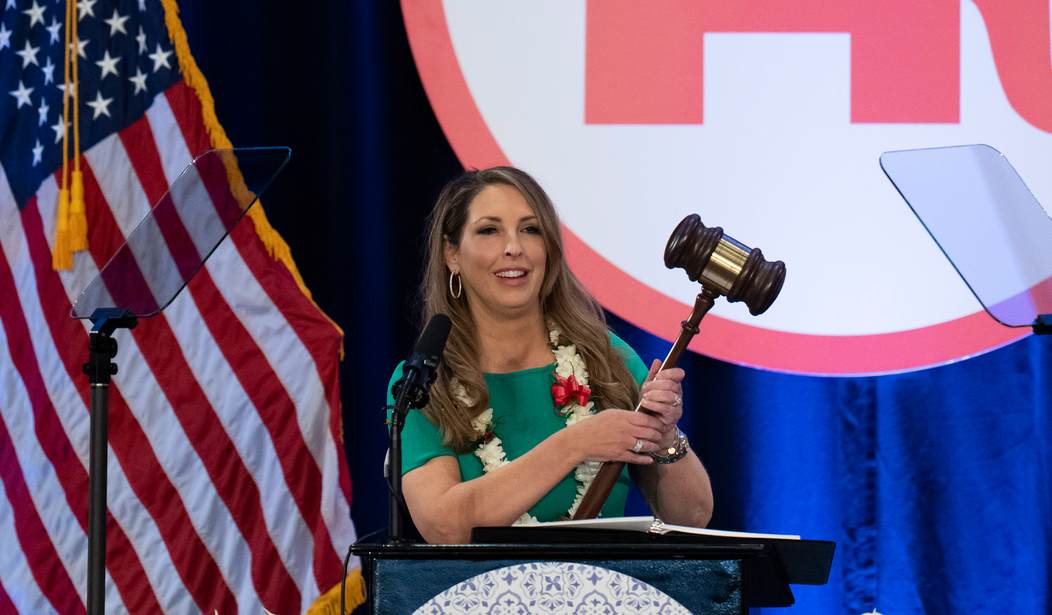The first RNC Republican primary debate is now just three weeks away. So far, there's seven candidates who qualify based on polling and donor threshold. But, new criteria for the second RNC debate to take place on September 27 could leave some candidates off of the stage. A Tuesday report from POLITICO, citing "a person familiar with the plans," lays out the details:
According to a person familiar with the plans, candidates will need to hit at least 3 percent in two national polls, or 3 percent in one national poll and 3 percent in two polls conducted from separate early nominating states (Iowa, New Hampshire, South Carolina and Nevada), in order to qualify.
The polling threshold is higher than the first debate, for which a candidate will need to poll at least 1 percent in three national polls or 1 percent in two national polls and 1 percent in two early-state polls, in order to qualify.
For the second debate, the polls the RNC will count must meet the same criteria as for the first debate: conducted with large sample sizes and by firms that are not affiliated with any of the candidates.
Additionally, the committee has raised the benchmark for the number of donors each candidate must have in order to get on the stage for the second debate. Candidates must have a total of at least 50,000 unique donors, with at least 200 unique donors from at least 20 states or territories. The threshold must be reached no later than 48 hours before the debate.
The report also stresses how significant these changes are and that they "could alter the contours of the primary, potentially winnowing down the number of candidates who will be able to appear onstage at the Ronald Reagan Presidential Library in Simi Valley, Calif., on Sept. 27."
Candidates who have qualified include former President Donald Trump, Florida Gov. Ron DeSantis, former South Carolina Gov. Nikki Haley, Sen. Tim Scott of South Carolina, Vivek Ramaswamy, former New Jersey Gov. Chris Christie, and North Dakota Gov. Doug Bergum.
Recommended
Those candidates who meet polling and donor criteria will also have to sign pledges to support the eventual nominee and not participate in non-RNC debates.
The race currently contains 12 candidates, with Trump remaining a clear frontrunner. He currently has 53.9 percent support, for a spread of +35.8, according to RealClearPolitics (RCP). Both Trump supporters and opponents alike have called for a more narrow field, but for obviously very different reasons.
During last Saturday's rally in Erie, Pennsylvania, Trump called on his primary rivals to drop out so that they could rally around him. Kari Lake, who was the Republican gubernatorial nominee in Arizona for 2022, issued such a call on Tuesday night in response to still more indictments issued against Trump by Special Counsel Jack Smith, this time over January 6.
This latest SHAM indictment is the line in the sand.
— Kari Lake (@KariLake) August 1, 2023
That's why I'm calling on all Republican primary candidates to suspend their campaigns & rally around President Donald J. Trump.
READ my full statement ⤵️ pic.twitter.com/4VhQWLhghj
However, those looking to stop Trump from winning the nomination, including Sen. Mitt Romney (R-UT), have laid out a plan of action in hopes to do just that. Especially when it comes to looking to prevent Trump from winning state contests with a plurality, "Donors who are backing someone with a slim chance of winning should seek a commitment from the candidate to drop out and endorse the person with the best chance of defeating Mr. Trump by Feb. 26," Romney wrote in an op-ed for the Wall Street Journal last month.
Here's How Mitt Romney Is Looking to Get Involved in the 2024 Presidential Election https://t.co/k8PuIsaEoo
— Townhall.com (@townhallcom) July 25, 2023
Although Trump has been coy about whether he'll participate in the debate, citing how he is already leading by such wide margins, he did mention earlier this week on TruthSocial that he might select his running mate based on debate performances.
His post contained an emphasis on "MIGHT," though, and tellingly said, with added emphasis, "Let them debate."

























Join the conversation as a VIP Member